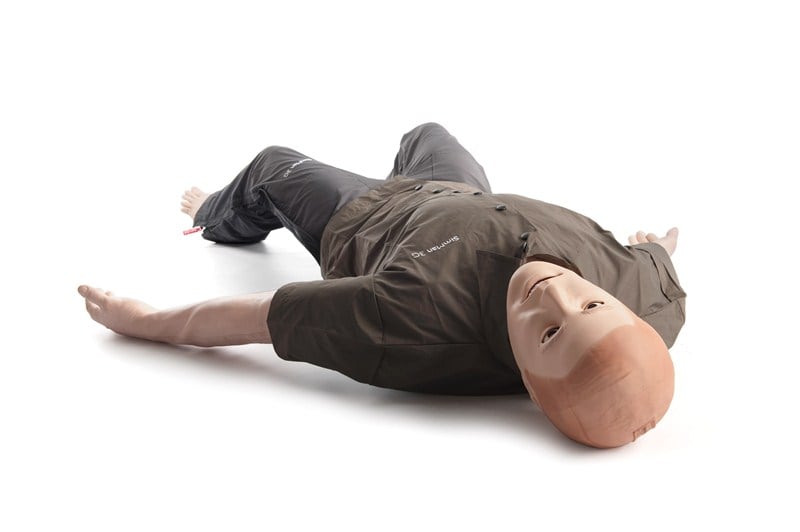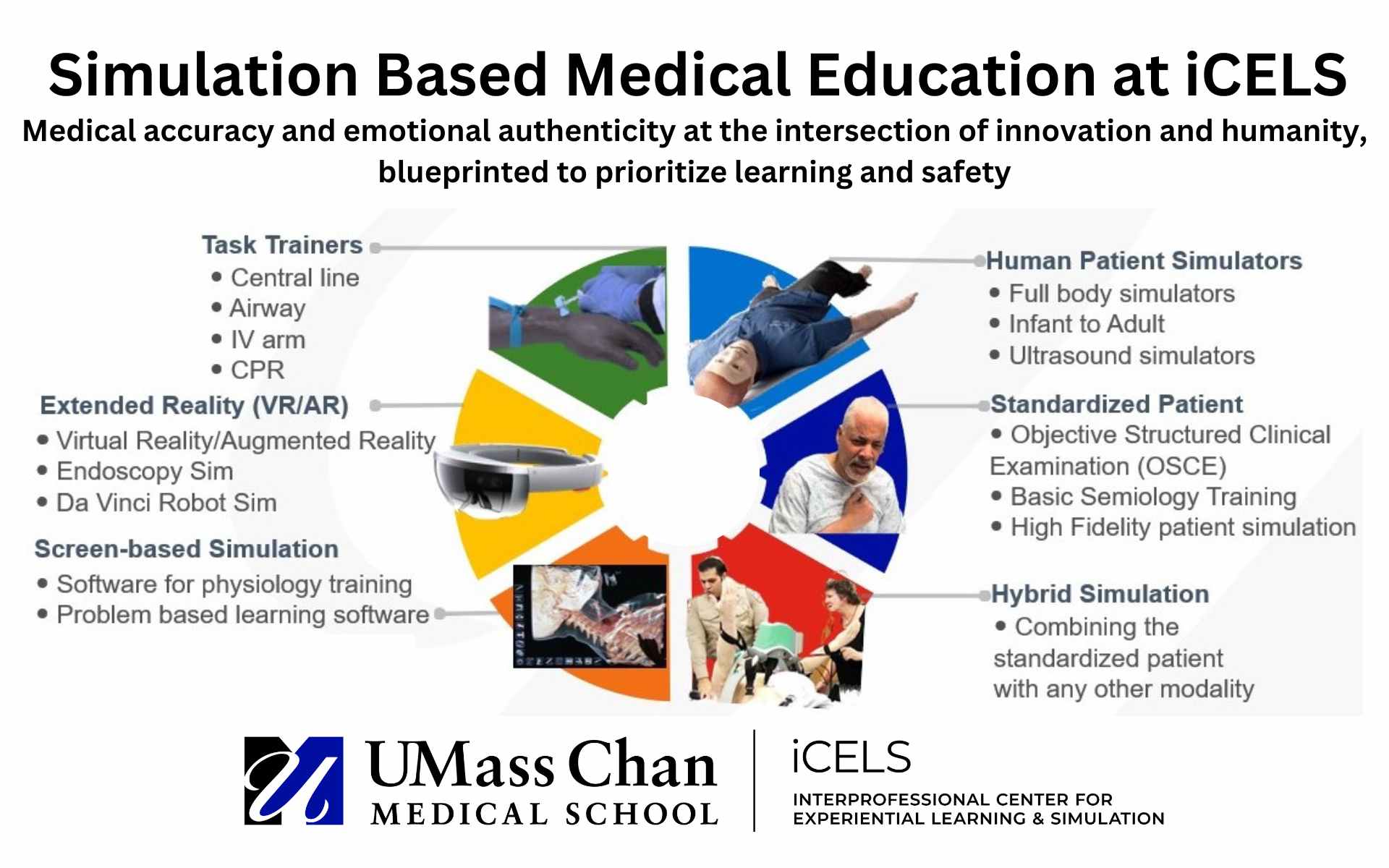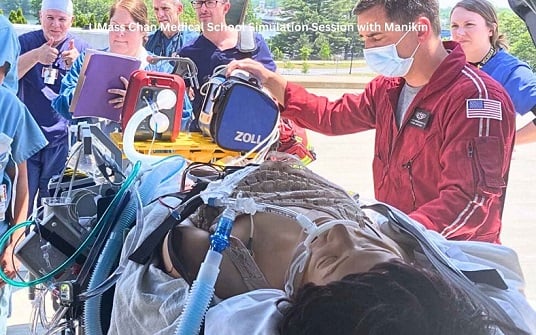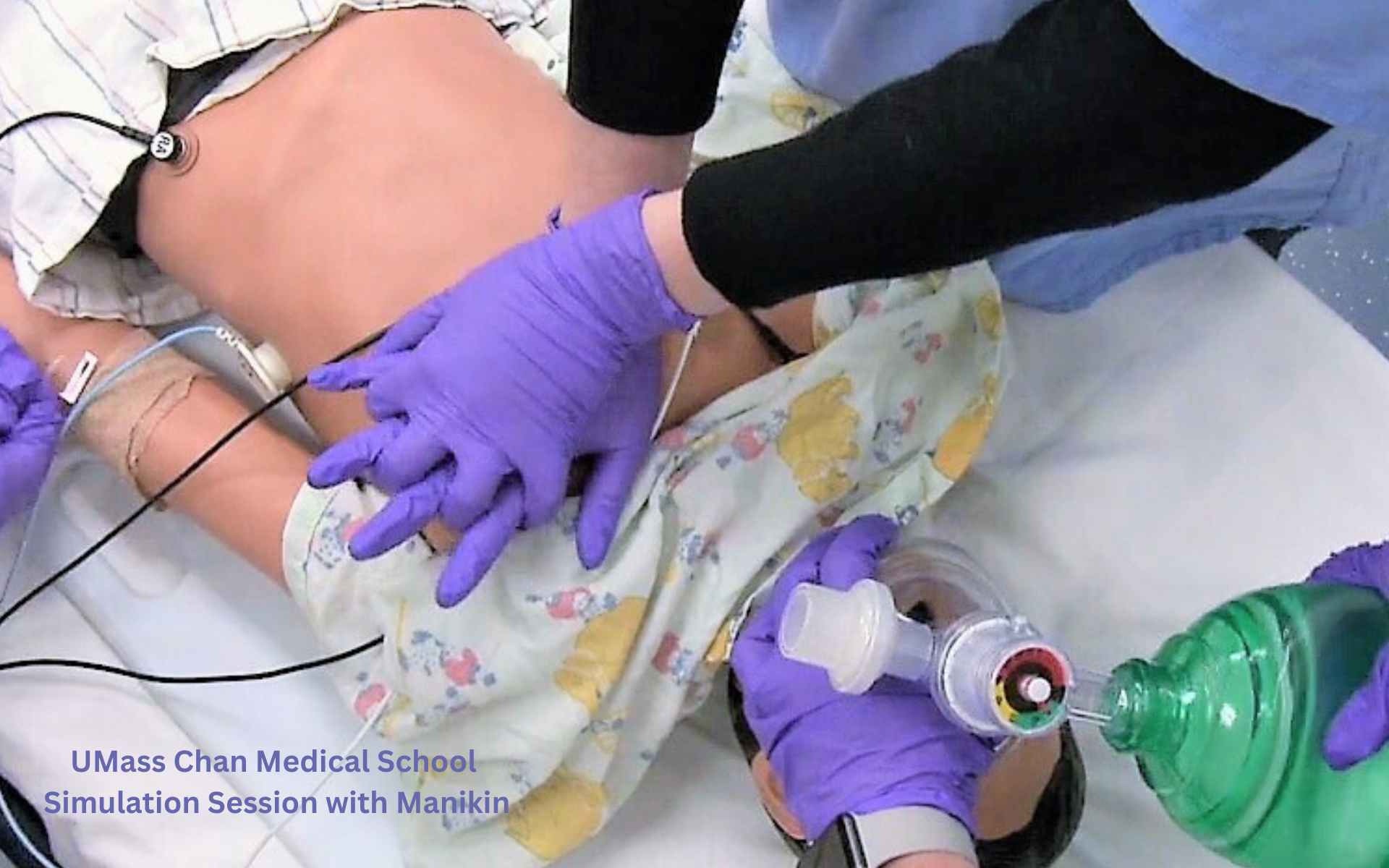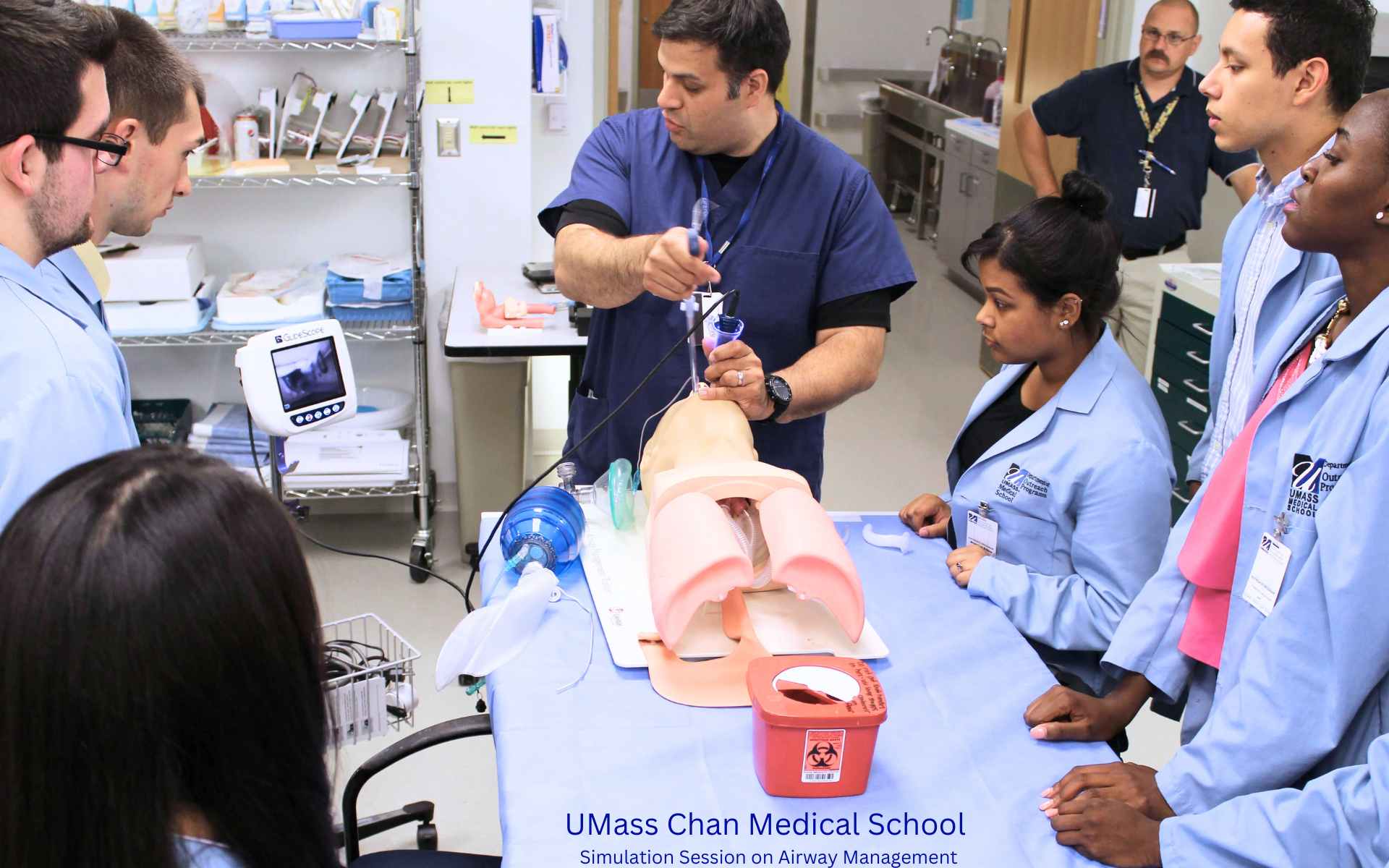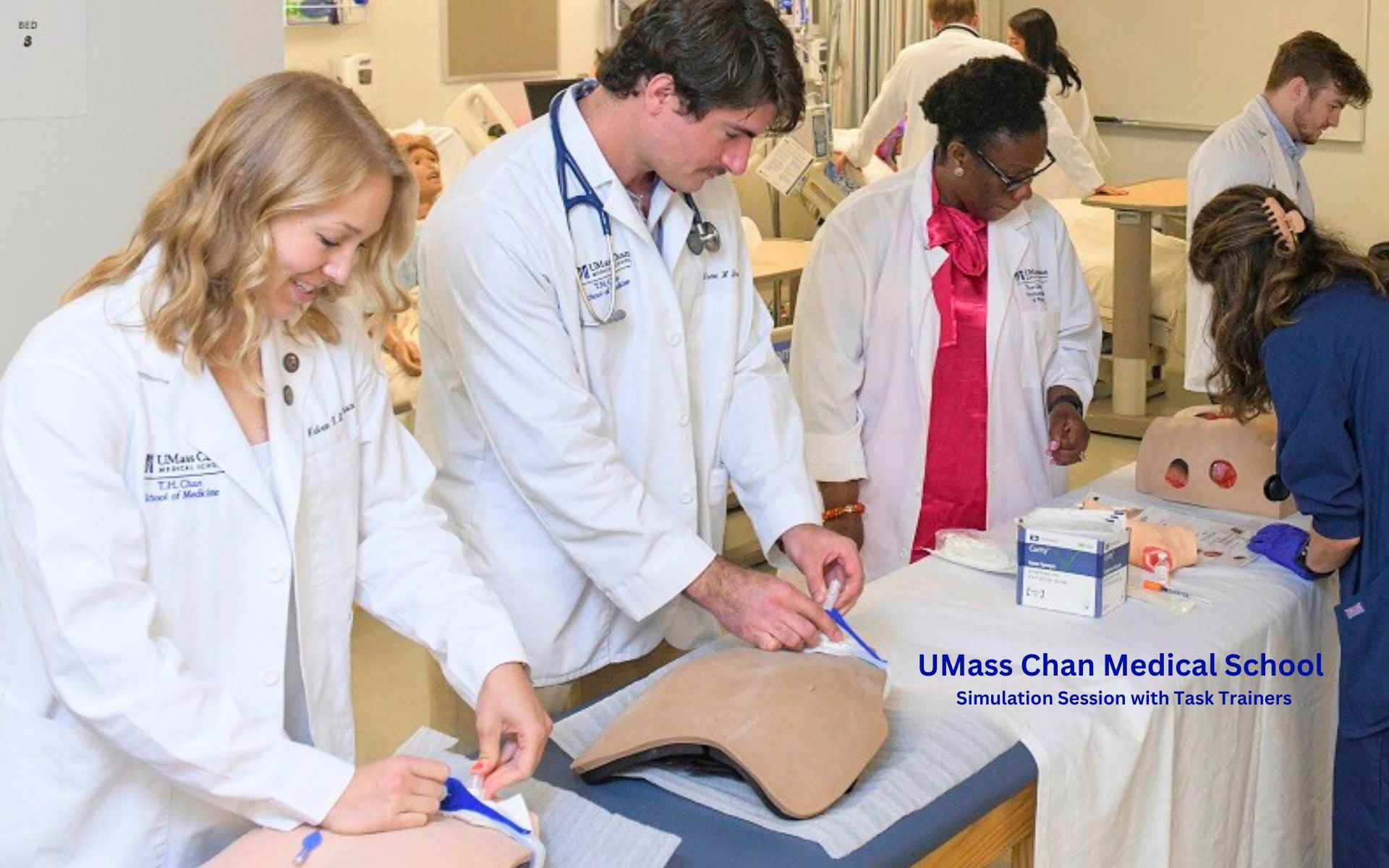Simulation & Experiential Learning Lab
Simulation & Experiential Learning Lab
UMass Chan Medical School iCELS Simulation Lab is home to an extensive inventory of manikins, task trainers, virtual and surgical simulators, as well as expertise in teaching methodologies. From medical students assessing and treating their first patients to experienced providers practicing rare events, medical simulation caters to all levels of healthcare practices. These can involve a range of modalities - from a standalone task-trainer to a sophisticated ICU setup, from a self-directed practice station to a disaster scenario involving a whole healthcare team. An ever-expanding inventory is on its way to meet growing demands. Please select a topic - including currently popular modalities as listed below - to jump to its corresponding section:
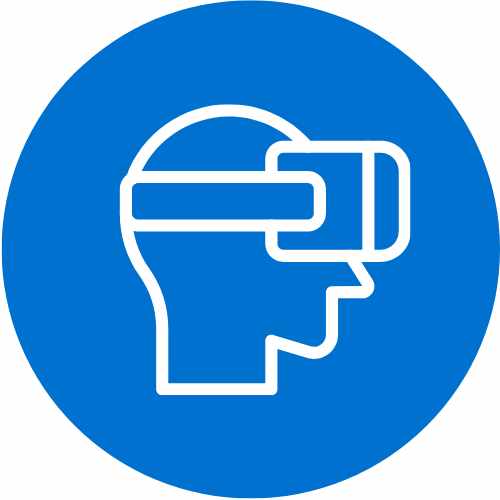
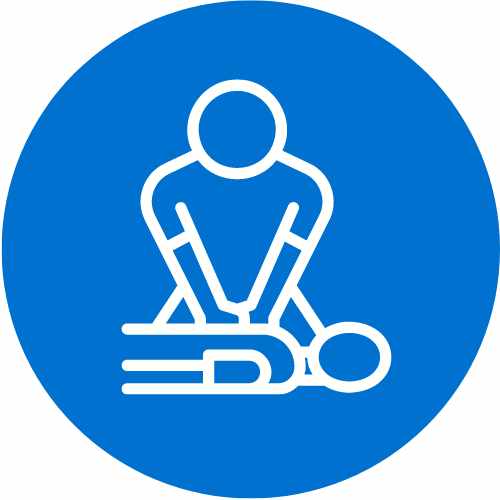
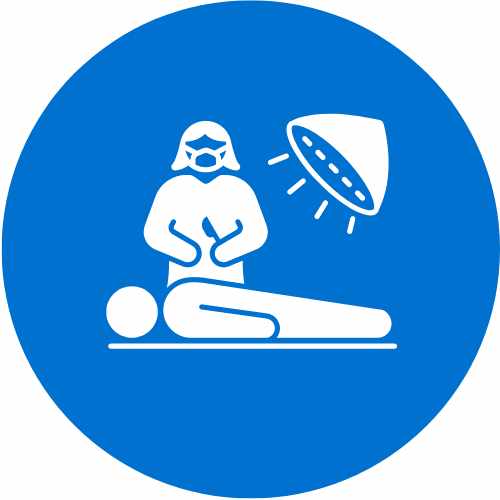
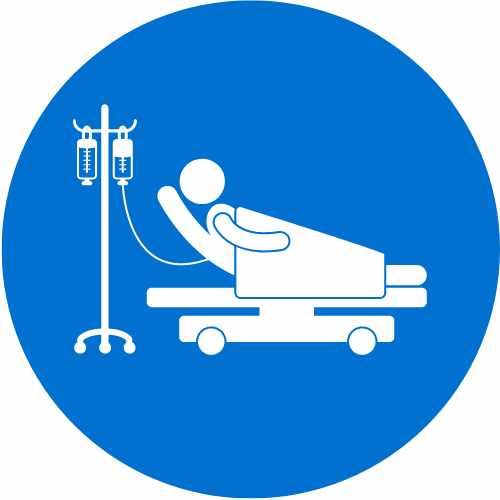
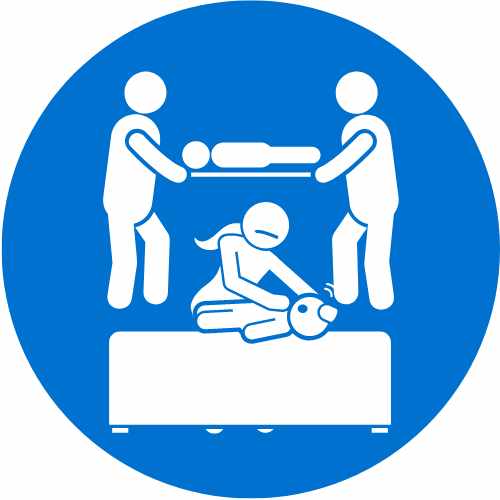
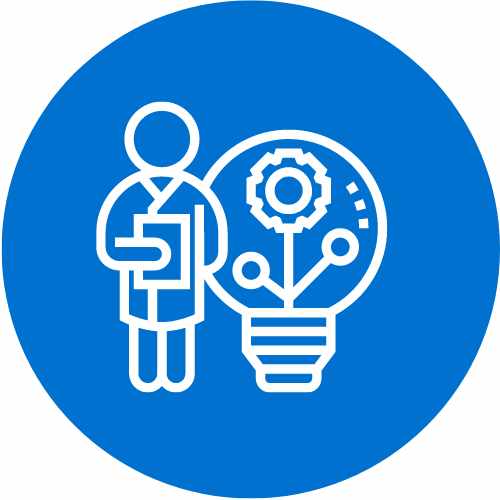
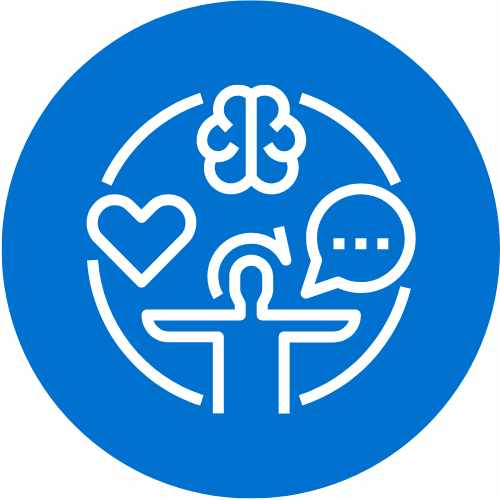
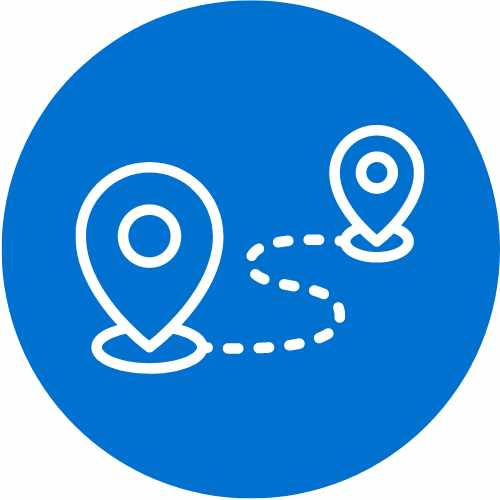
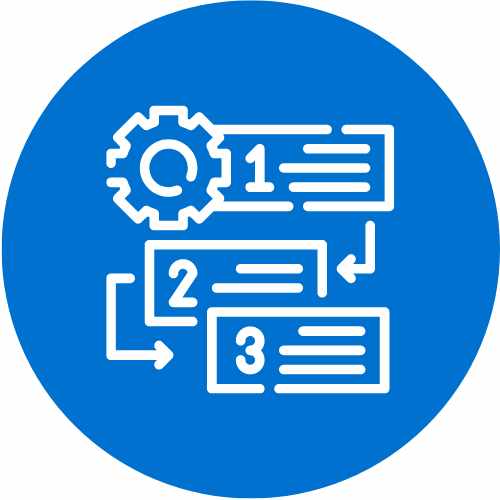
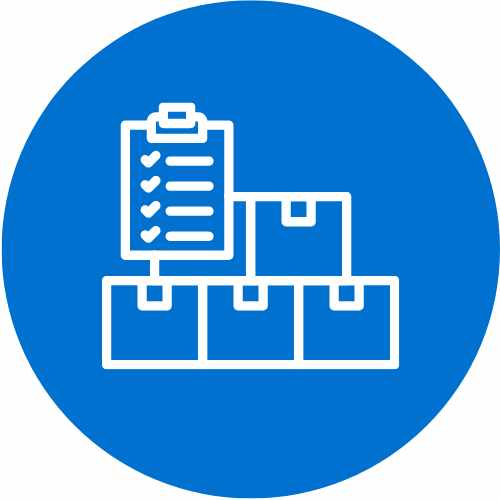

Virtual & Digital Learning
The next generation of simulation technology is here at UMass Chan Medical School iCELS.
Screen-based Simulations
Screen-based simulations use digital technology to represent patients, populations, or other healthcare encounters on a computer screen or a mobile tablet, smartphone, or other screen-based device. These include uses of virtual patients, virtual worlds, screen-based haptic trainers, and resource management simulators. Simulations using screens have advantages over mannequin-based simulations — the software is infinitely replicable, the simulation programs can be portable, they can be accessed asynchronously without a live instructor present, the software can be distributed to many devices, and the programming can track massive amounts of usage data.
The best example of iCELS screen-based learning is the Academic Healthcare record. A simulated but functioning version of EPIC exists for medical learner practice. During the COVID-19 pandemic precaution period, UMass Chan Medical School continued its curriculum by delivering virtual simulations of such. While face-to-face interactions and in-person learning are preferred, interests and applications of virtual simulations have continued and the level of engagement in distance learning has provided a pleasant surprise.
Extended / Virtual / Augmented Reality (XR/VR/AR)
Extended Reality (XR) is the use of computer technology to create an interactive 3-dimensional world in which the objects have a sense of spatial presence. The term encompasses Virtual Reality (VR) and Augmented Reality (AR). Virtual reality uses goggles to completely immersive participants in a simulated world while Augmented reality uses eye wear technology to superimpose digital characters in the actual environment. These goggle- and joystick- or computer-based ‘smart games’ mimic patient care scenarios and in which learners participate as they would in role-play games that provide an immersive experience.
EXAMPLE
Medical learners experience grocery shopping as a person that deals with food insecurity. Screen-based / Computerized Simulation – programs and applications that allow learners to interact with medical images on a tablet or computer.
Further Development
UMass Chan Medical School iCELS is also:
-
- Working with Instructional Designers to create Independent Learning Modules to create engaging asynchronous eLearning for learners
- Looking into Gamifying Education for formative education as well as on boarding new employees
- Providing Implicit Bias Training for cultural awareness during research subjects recruitment and obtaining consent
- Providing Tiered Faculty Development to standardize simulation pedagogical approach •
- Using simulation education debriefing skills to promote psychological safety and allow clinicians to openly share thoughts, emotions, wins and losses in 10-min Hot Debrief after codes – the hope is that these conversations will help mitigate burnout, low morale and improve collegiality and well-being – as a fortunate byproduct, the hope is that clinical quality will improve as happy, engaged employees tend to outperform their colleagues.
Medical Task Trainers
Medical task trainers are partial or full body physical devices that represent a specific part of the human body or medical procedures, that are widely used in healthcare education and practice for the purpose of targeted training among healthcare learners to effectively meet the goals of psycho-motor skill development, confidence building, and improving patient safety, especially when facilitated with supervision, feedback, and debriefing.
The UMass Chan Medical School iCELS Simulation Lab is ready to provide you with access to training and access to a range of tasks for small group learning as well as self-directed practice:
- From Cardiopulmonary Resuscitation (CPR) to Airway Intubation for Adults and Pediatrics
- From Intravenous (IV) Insertion to Arterial Blood Gas (ABG) Placement and Central Venous Catheter (CVC) Line Placement
- From Male and Female Pelvic Examination to Advanced Patient Care Female/Male Catheterization Simulations
- From Suturing for Wound Management to Joint Injection and Lumbar Puncture
- Ultrasound Imaging
These targeted trainers allow for scaling of the training session as you can potentially have 5 airway stations or 5 IV arms concurrently running in one classroom to support skills development and repeated focused practice with feedback, known as deliberate practice.
Surgical Skills Trainers
UMass Chan Medical School iCELS Simulation Lab's Surgical Skills Space offers both dry lab and wet lab experiences. Laparoscopy, surgical microscopy, surgical cautery and suturing are available for deliberate practice and assessment. This space also provides you with training and access to the sophisticated da Vinci Surgical System and GI Mentor™ Endoscopy Sim.
da Vinci Surgical System
The da Vinci Surgical System is a sophisticated robotic platform designed to expand the surgeon’s capabilities and offer a state-of-the-art minimally invasive option for major surgery. With da Vinci, small incisions are used to insert miniaturized wristed instruments and a high-definition 3D camera. Seated comfortably at the da Vinci console, your surgeon views a magnified, high-resolution 3D image of the surgical site inside your body. At the same time, the latest robotic and computer technologies scale, filter and seamlessly translate your surgeon's hand movements into precise micro-movements of the da Vinci instruments. Although it is often called a “robot”, the da Vinci System cannot move or operate on its own; your surgeon is 100% in control. Practicing with a simulator console in iCELS will help surgeons to refine their da Vinci skills.
GI Mentor™
GI Mentor™ is a top-of-the-line endoscopic medical simulator for the training of gastrointestinal upper and lower endoscopic procedures, offering a comprehensive library of modules with more than 120 tasks and virtual patient cases. The simulator provides multiple training opportunities with true to life patient cases offering realistic scenarios of clinical situations, ranging from simple diagnostic procedures to advanced ERCP procedures and Endoscopic Ultrasound (EUS) procedures. Original Colonoscope and Duodenoscope have been customized to provide realistic simulation including tactile sensations and various endoscopic tools. The GI Mentor provides an excellent environment for practicing clinical procedures in a safe and realistic manner.
High-Fidelity Manikins
High-Fidelity Human Patient Simulator Manikins (or Mannequins) are computers that look like full-sized human patients, have life-like features, and can physically mimic a real-life patient. Their eyes blink, their pupils react to light, their airway can be manipulated to cough; they can replicate a full range of biological actions including heart rate, lung sounds, pulse, and oxygen percentage; and they can be positioned in a bed, chair or floor. They are wireless and can be used outside of the sim lab as they are not constrained by infrastructure. This allows for configurations that provide both learners and experienced practitioners with hands-on opportunities to learn, practice and assess skills in a high-fidelity yet risk-free and repeatable simulation environment, including cardiac arrest and respiratory distress scenarios.
UMass Chan Medical School iCELS provides you with access to an extensive inventory of high-fidelity human patient simulators which represents the span of human development – from newborns, infants (including a premature infant), children, male and female adults as well as a birthing simulator with a neonate. A skilled simulation technician can dynamically control all of the manikin’s clinical readings and program enhancements like voices, coughs and wheezing. Utilizing a variety of clinical scenarios, learners will have the opportunity to engage in deliberate practice in a controlled environment. Clinical scenarios can range from mock codes to clinical decision-making encounters in acute care, trauma settings, patient ward or operating room. Faculty and instructors can tailor objectives towards team-based communication and collaboration skills, as well as diagnostic skills.
The simulation rooms at UMass Chan Medical School iCELS are equipped with video capabilities that allow all simulation sessions to be viewed from a separate room. All sessions can be recorded and played back for review in debriefing or in individualized coaching sessions after the simulation is completed. The recording system is web based so live streams can also be viewed from any location via secured online access.
EXAMPLE
A team of clinicians work to secure a patient’s airway. When properly planned, its hard to differentiate a simulated scenario from a real one.
Hybrid Simulations
Hybrid Simulations combine multiple modalities of simulation – such as a High-Fidelity Human Patient Manikin as the patient, a Standardized Patient / Simulated Person role playing as the distraught family member, at a Versatile Simulation Space such as one that has been configured to look like an emergency room – to enhance the reality of a scenario by recreating a ultra-realistic environment, physiology, emotions, and dialogue of a real patient encounter.
For learners with advanced abilities, this set up introduces ‘noise’, also known as realistic distractors to make the scenario more lifelike. Working with clinicians of all levels and disciplines allows a true interprofessional environment, similar to what healthcare providers experience in a hospital or clinic setting.
The UMass Chan Medical School Simulation Lab Team works closely with faculty to create the most realistic scenarios possible. The goal is for these collaborations to truly benefit leaners, providers, and patients in the future.
EXAMPLE
Resuscitation of a patient, whereby the EMS provider is caring for the patient (i.e. a high-fidelity full body human patient simulator manikin), while an SP plays the role of a concerned family member. In such scenario, the cognitive domain of caring for a cardiac arrest patient and the affective domain of interacting with family members can be engaged. Learners must address both the needs of the patients as well as the needs of the family to heighten the quality of the clinical encounter.
EXAMPLE
A patient requires a central venous catheter – for an experienced group of learners, the task trainer is paired with a High-Fidelity Human Patient Simulator Manikin on whom a central line can be placed during the scenario.
Process & Device Usability Testing
New therapies undergo significant regulator testing and scrutiny. Imagine engaging with simulation-based testing before finalizing the product. The simulation lab can recreate clinical, home, and outpatient spaces that can provide the perfect background for beta testing and pilot testing.
UMass Chan Medical School iCELS Simulation Lab is experienced in carrying out process and device usability testing sessions to evaluate how well the users can interact with the product or service, and identifies any issues or improvements that can be made. Perhaps you have a new clinic or workflow and you’re interested in discovering gaps or latent threats. We’re able to work in dynamic environments using principles of simulation, teamwork, and leadership to explore and define protocols, or to test new environments.
Equipped with live video viewing, recording, and playback capabilities, the simulation center allows the usability testing to be to be viewed on location from a separate room or from remote locations via secured online access.
EXAMPLE
The clinical system began laparoscopic surgery at a satellite campus. While relatively safe, there is a risk of vascular damage. Using our Process & Device Usability Testing method, UMass Chan Medical School iCELS developed a full scale in-situ simulation that involved a bleeding mannikin in the Operating Room, stabilization, dispatch and transport of blood products, arrival and transport via ambulance and activation of the vascular team.
Customize Your Simulation
UMass Chan Medical School’s interprofessional Center for Experiential Learning and Simulation (iCELS) collaborates with departments and faculty, both from UMass Chan and external organizations, to deliver an exceptional depth of resources and professional services grounded in the use of our facilities and services, to serve the needs of medical, nursing, and allied health clinician, educator, as well as researcher communities. Holding extensive experience in providing assessment, consultation, and support in running simulation sessions in and beyond our immediate geographical location, our team is ready to collaborate on new projects with you to customize or develop curriculum, build scenarios, create skills workshops, and teach you how to use the equipment as well as carry out effective debriefing to meet learning goals and objectives.
Talk to us today about the right mix of sim modalities to meet the needs of your learners. Your can get started by visiting this section on Consulting to Customize & Create Your Own Healthcare Simulation Session.
Simulation Activity Locations
UMass Chan Medical School iCELS medical simulation sessions can be held at your venue, or ours.
Firstly, let us welcome you to UMass Chan Medical School iCELS’s 22,000sq ft simulation space at Levels 2 and 3 of the Albert Sherman Building - this large, purpose-built center was launched brand-new in 2012 as part of the medical school's commitment to create better outcomes by closely mimicking healthcare professionals' working environments to create a high-fidelity learning experience. Areas at this simulation center can be configured to look like home, public, business or healthcare environments including a clinic office, hospital ward, emergency room (ER), Intensive Care Unit (ICU) or Operating Theater (OR) – with real, usable equipment and setup, complete with high-fidelity manikins and standardized patients in the case of hybrid scenarios, to simulate real world challenges from mobility to teamwork. In this experiential learning environment, medical simulations are frequently used to teach, assess, model, study, and perfect processes and procedures as well as problem-solving skills before implementing them with real life patients.
Nonetheless, the presence of our simulation activities extend beyond the UMass Chan Medical School campus. In 2022, guided by our principle to serve public health in the region, iCELS launched the OnSiteSim service to bring healthcare simulations to your venue. Please visit our OnSiteSim page for details on how we can bring the simulation to your location!
How Does a Simulation Session Work?
Whether you are a novice or an expert, our team is interested to work out a session that provides high value learning for greater outcomes. We can help you develop curriculum, build scenarios, create skills workshops, or show you how to use equipment to enhance your experiential sessions. How should we get started?
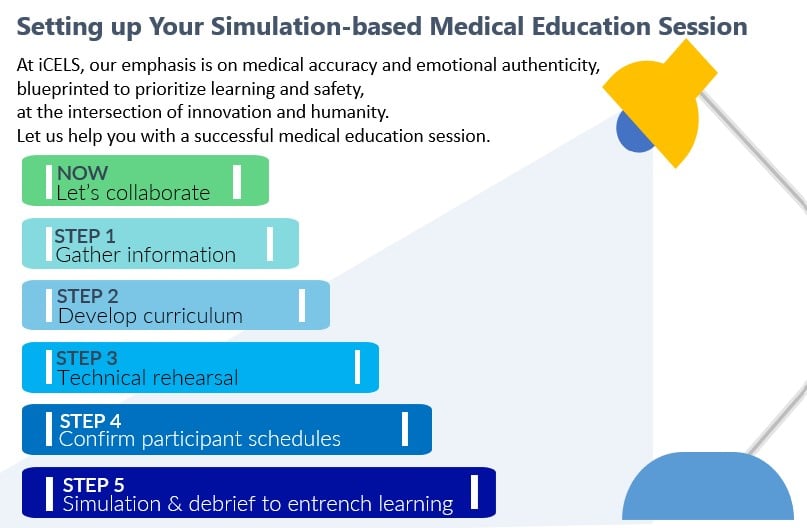
STEP 1: Gather Information
Let us know about the learning objectives, type and number of learners, target dates, and all relevant aspects of your simulation session so we can help plan an event to meet the defined goals effectively.
STEP 2: Develop Curriculum
We are ready to support your planning by tapping on our simulation team's extensive experience in defining scenarios, tools, workshop format, as well as refining schedule and setup recommendations to help achieve optimal outcomes for your sessions.
STEP 3: Technical Rehearsal
Our technical rehearsal together will serve as an important test run ahead of the actual simulation with your larger group of participants. Rehearsals like this can be extremely effective in closing any setup and information gaps. Most of all, it is also a highly valuable opportunity to practice the use of all tools, observation methods and key takeaways during debrief so that your simulation session would proceed smoothly as scheduled.
For Process & Device Usability Testing, this step will involve preparing the testing environment, materials, and equipment, such as the device, the software, the instructions, the consent forms, and the recording devices.
STEP 4: Confirming Participant Schedules
At this point, your participants' schedules should be finalized and all logistical details conveyed - including directions, parking and building access instructions where applicable - for smooth-running on the actual day of the simulation event. We emphasize the need for all your participants to receive access instructions beforehand if this is a self-directed learning session, or if it involves remote observers.
STEP 5: Simulation and Debrief
Our team will be present as the simulation event takes place - whether onsite or online, at your venue or ours, with or without recording - as planned.
The final phase of the simulation is the Debrief. UMass Chan Medical School iCELS recommends and supports the use of debriefing as an essential component of learning through simulation. While various approaches exist, they involve the participants' self-reflection as well as feedback from the facilitators including our team members if you prefer, aimed at reinforcing good practices and providing deliberate practice to promote positive and desirable development in the participants.
Studies have shown that learners who observe a simulation (not play a role in the sim) but participate in an effective debrief can walk away from the experience having met the same learning outcomes as those who were primary participants. The debrief is an essential phase of simulation that connects the actions and results to the learning objectives. For this reason, some simulation specialists opine that the only reason to sim is to debrief. Emotions and previously-held mental frameworks are discussed in debriefing sessions. Holding the core belief and basic assumption that learners are trying their best to do well, we can use curiosity to discover these Frames: which are assumptions, beliefs, past experiences, and knowledge that learners have. These frames lead to the actions taken during an event and those actions have real world implications. In simulation, the results are seen in the vital signs and progression of the simulation. By engaging in this conversation, frames can be bolstered or changed when new results are desired. The process of uncovering frames is delicate as learners demonstrate vulnerability when they expose their frames.
In the spirit of learning through simulation, our team also welcomes your sharing of feedback on what went well and any areas for improvement, as these help us achieve better outcomes together.
For Process & Device Usability Testing clients, this step will involve communicating key findings and recommendations for enhancements, as well as providing data for your analysis.
View Our Current Inventory
iCELS offers a wide range of clinical inventory, medical task trainers, high-fidelity human patient simulators, as well as virtual and digital learning simulators from industry-leading companies. Our inventory is available for in-center use or can be checked out by faculty for in-situ use in the hospital.
Please click here to view our simulation lab's current inventory.
However, as we are always updating and expanding this list, prior to your simulation session please also check in with us for the most updated listing. We look forward to working with you.
Frequently Asked Questions
Last updated: Jul 19th, 2023
About iCELS Simulation & Experiential Learning Lab
Who Is Eligible to Participate in a Simulation Session at iCELS?
Learners: All levels of learners in the T.H. Chan School of Medicine, Tan Chingfen Graduate School of Nursing, allied health including physical therapy, residents, praticing healthcare professionals (HCPs) undergoing continuing medical education sessions; as well as your educators and administrators, where applicable. We also conduct sessions with industry partners, high schools, and government officials. We welcome you to reach out and discuss your healthcare simulation needs with us today.
How do I customize a course that is found in your catalog?
UMass Chan Medical School’s interprofessional Center for Experiential Learning and Simulation (iCELS) collaborates with departments and faculty, both from UMass Chan and external organizations, to customize courses from our catalog offerings so that it suits your learning group's needs. We welcome you to reach out and discuss your healthcare simulation needs with us today.
What dates can I hold my simulation session?
iCELS runs a number of sessions and activities in its 24,000 sq ft space spanning 2 levels at UMass Chan Medical School campus Albert Sherman Center. Some periods are busier than others. The timing of your session depends on its formats and setup requirements. Most sessions would require planning to ensure the objectives are met, and the outcomes measured for learning effectiveness. For example, we have had experience offering self-directed learning station for airway management for 24x7 at the start of the COVID pandemic in 2020. To find out when a simulation session can be held, we welcome you to reach out and discuss your healthcare simulation needs with us today.
You might also be interested in:
